GARDENS BY THE BAY
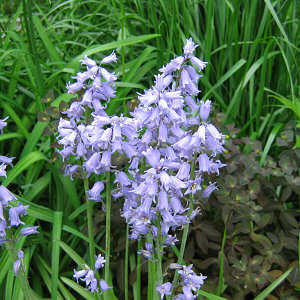
MINOR BULBS & THEIR COMPANIONS
"Minor" by classification only, these bulbs are "major" in every other respect. Generally they are very early to bloom, small in size and as one web site states "underutilized". Plant them by the dozens, even hundreds, for greatest impact. They are very inexpensive. Tuck them in wherever you can and by next February or March you'll be very glad you did. What could be more exciting than doing a late winter tour of your beds and seeing some of these beauties popping up through the snow.
* Watch for the animated hummingbird and butterfly with the plants that attract them. *
The deer icon indicates plants that deer are not usually attracted to.
   The best time and method to propagate plants can be found on our image-intensive PROPAGATION page.
To help your plants grow their best, check out our FERTILIZATION page.
To create your own plant partnerships based on tried and true color theory, check out our GARDEN COLOR page.
To see if a particular plant is on this page press Ctrl+F, type in the name, then click the Find button.
The best time and method to propagate plants can be found on our image-intensive PROPAGATION page.
To help your plants grow their best, check out our FERTILIZATION page.
To create your own plant partnerships based on tried and true color theory, check out our GARDEN COLOR page.
To see if a particular plant is on this page press Ctrl+F, type in the name, then click the Find button.
CHIONODOXA
Sometimes referred to as "snow glories", Glory of the Snow has starry flowers with white centres. Choose from pink, blue or white shades and from small- or large-flowered forms. Plant in autumn 5 inches deep and 1-2 inches apart.
Chionodoxa: Glory of the Snow
under: Dianthus (dwarf Alpine & Maiden Pinks)
with: Pulmonaria, Stachys byzantina
underplanting for: Iris pallida pallida, Kolkwitzia amabilis (Beauty Bush), Philadelphus coronarius (Mock Orange)
complementary bloom time with: Galanthus nivalis, Leucojum, Tulipa tarda
springtime combination with other early bulbs: Scilla sibirica, Scilla tubergeniana, Crocus & Eranthis
Chionodoxa de luciliae: Glory of the Snow, blue shades
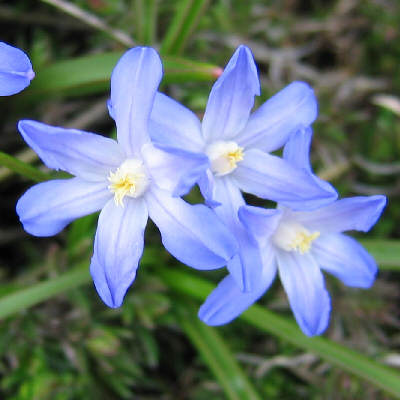
interplanted in shade with: Lamium maculatum 'White Nancy'
with: miniature Narcissus 'Tete a Tete' or other miniature Narcissus forms
with: Tulipa tarda, Tulipa kaufmanniana, Crocus (yellow & white) in drifts, early daffodils
with: Vinca minor
under shrubs: Forsythia, Philadelphus coronarius, Kolkwitzia
complementary bloom time: Galanthus nivalis, Eranthis hyemalis, Leucojum
Chionodoxa luciliae: Glory of the Snow, pink shades
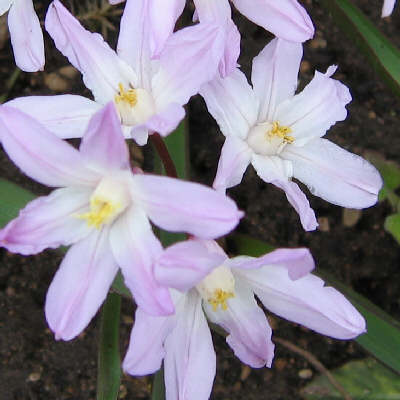
with: Narcissus 'Tête à Tête' (miniature)
Chionodoxa de luciliae 'Alba': Glory of the Snow, pure white
with: Chionodoxa de luciliae (blue forms)
Chionodoxa de luciliae 'Gigantea': largest-flowered, a bright mid-blue
with: early-flowering Narcissus
shady combination with: Galanthus 'Simplex', Muscari armeniacum, Narcissus 'Dutch Master', Narcissus 'Thalia', Narcissus 'Hawera', Scilla 'Blue Queen'
Chionodoxa sardensis: a shorter species, gentian-blue
under: Tulipa greigii 'Donna Bella'
ERANTHIS
Winter Aconite, only 3-4" tall, co-blooms with many other so-called "minor" bulbs. Its golden-yellow flowers appear and finish, only then to be followed by the foliage. Plant them no later than August. Soak the tubers for several hours first before planting them so the bottom of each is 6 inches deep and bulbs are only 1-2 inches apart.
Eranthis hyemalis: Winter Aconite
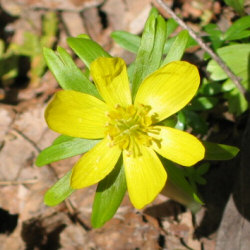
where: in shade, on woodland banks, as carpeter in shrub borders
complementary bloom time: Chionodoxa de luciliae (blue), Galanthus nivalis, Scilla bifolia (the earliest-blooming squill)
combined with: Scilla sibirica, Scilla tubergeniana, Chionodoxa de luciliae, Crocus
with other early bulbs: Crocus 'Striped Beauty' (purple & white striped), Iris reticulata
do not plant with: Lamium maculatum 'White Nancy'
under: Cornus spp.
More information about growing this bulb can be found at the link below.
shade-loving Eranthis
FRITILLARIA
 The Fritillary genus has many types and sizes, very different in appearance from one species to another. Most have bell-shaped flowers in clusters atop long stems. Bulbs should never be allowed to dry out and fertile very well-drained soil suits their needs. Planting depth and spacing will depend on the species.
Fritillaria imperialis: Crown Imperial Fritillary, brick-red
The Fritillary genus has many types and sizes, very different in appearance from one species to another. Most have bell-shaped flowers in clusters atop long stems. Bulbs should never be allowed to dry out and fertile very well-drained soil suits their needs. Planting depth and spacing will depend on the species.
Fritillaria imperialis: Crown Imperial Fritillary, brick-red
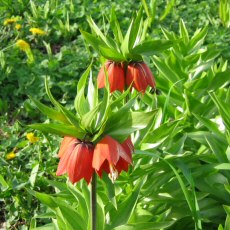
behind: early-blooming Tulipa 'General de Wet' (a soft orange)
Fritillaria imperialis rubra: Crown Imperial Fritillary
synonym: Fritillaria imperialis 'Rubra Maxima'
where: a sheltered spot in climates colder than Zone 6
in drifts with: flowering shrubs and foliage perennials
behind: tall hybrid Narcissus
Fritillaria imperialis: yellow forms
with: Tulipa 'Bellona' (an early yellow)
Fritillaria meleagris: Checkered Lily, Snake's Head Fritillary, 10-15", delicate with nodding bell-shaped blooms
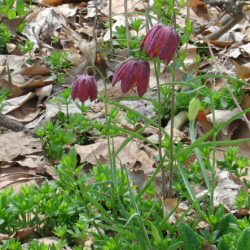
plant: 6" deep, 2-3" apart
where: partly sunny woodlands
interplanted between: large Hosta forms, ferns, Dicentra
Fritillaria pallidiflora: yellow to greenish-yellow flowers
where: sun to light shade
IRIS
 If you are only familiar with the summer-blooming Bearded and Siberian Irises, you are in for a pleasant surprise with these diminuitive beauties that grow from a bulb. Plant them in fall in sun to light shade at least 4 inches deep and 2 to 3 inches apart. Dry soil after they bloom is to be preferred.
Iris histrioides major: Harput Iris, a bulbous form, 6-9"
If you are only familiar with the summer-blooming Bearded and Siberian Irises, you are in for a pleasant surprise with these diminuitive beauties that grow from a bulb. Plant them in fall in sun to light shade at least 4 inches deep and 2 to 3 inches apart. Dry soil after they bloom is to be preferred.
Iris histrioides major: Harput Iris, a bulbous form, 6-9"
under: Dianthus arenarius (white)
Iris reticulata: Reticulated Iris, a bulbous form, 4-6"
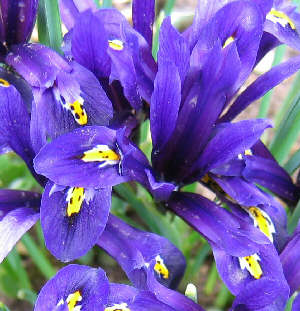
with other early spring bloomers: Crocus (yellow), Eranthis hyemalis, Galanthus nivalis, Scilla tubergeniana
with: Helleborus orientalis, low-growing ground covers
to grow up through: Dianthus arenarius, Vinca minor, Platycodon grandiflorus
interplanted with: yellow-flowered Crocus
drifted behind: Stachys byzantina
Iris reticulata 'Harmony': brilliant blue
under: Platycodon grandiflorus
While the bulbous Irises are lovely in the early spring border, there are many other summer-blooming choices to consider and information about their needs at the links below.
blue Iris
Iris for edging
orange Iris
purple Iris
red Iris
white Iris
yellow Iris
Iris with variegated foliage
LEUCOJUM
Giant Snowflake and Summer Snowflake are both common names for this early bloomer with pendent, bell-shaped flowers that are white with green markings, looking somewhat like Snowdrops. Moist soil in full sun to part shade is best. Plant 5-6 inches deep and 4-6 inches apart.
Leucojum: Snowflake
to co-bloom with: Galanthus nivalis, Chionodoxa de luciliae & Eranthis hyemalis
Leucojum aestivum: Giant Snowflake, Summer Snowflake, 9-12"
with: big, bold May-blooming Tulipa, tall Narcissus
in light shade with: Lamium maculatum 'Album', Pulmonaria 'Sissinghurst White', Myrrhis odorata (for an all-white effect)
above combination underplanted with: Tulipa 'Spring Green' (white with green veining)
Leucojum aestivum 'Gravetye Giant': Summer Snowflake
with: big, bold Tulipa (May-blooming), tall Narcissus or Tulipa
MUSCARI
Grape Hyacinth will seed around your garden, settling in nicely here and there, always welcome. They will grow under shrubs and trees as well as in full sun, preferring rich well-drained soil. Some species send up fall foliage and can be useful as "markers" for other plants. The species M. botryoides is one that does not produce fall foliage. Take your pick from white or blue to blue-purple forms. Plant them 3-4 inches deep and 4 inches apart.
Muscari: Grape Hyacinth
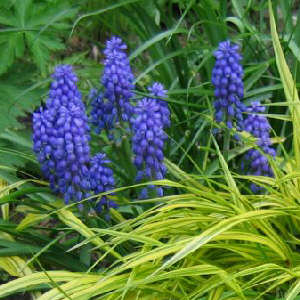
seen above offset behind clumps of Hakonechloa macra 'Aureola'
where: around crown of perennials for early colour, along a path, on woodland perimeter under deciduous trees
generally with: taller bulbs of almost any shade
with: Tulipa 'Blue Parrot', orange early Tulipa 'General de Wet', early yellow Tulipa Bellona', taller red Tulipa
including 'Red Emperor', white co-blooming Tulipa or species Tulipa forms
with: Narcissus (white and yellow), Narcissus 'Yellow Cheerfulness' or dwarf Narcissus forms
with other early bloomers: Aubrieta, polyanthus Primula, Viola including Viola 'Mauve Haze'
hide dying foliage and seedpods with: hardy Geranium or Iris sibirica
in front of: Cheiranthus
with: Anemone blanda, Epimedium, Helleborus orientalis, Pulmonaria saccharata 'Mrs. Moon', Thymus
near: Iberis sempervirens (pure white)
combined with: mixed Narcissus under flowering trees i.e. Magnolia or Cherry
under: Paeonia, Hemerocallis, Phlox, Achillea, Forsythia x intermedia 'Arnold Dwarf'
Muscari: a sky-blue form
with: Primula elatior (pale yellow)
Muscari: blue forms
with: Tulipa 'Bellona' (an early yellow), Narcissus 'Yellow Cheerfulness' & Fritillaria imperialis (a yellow form)
Muscari armeniacum: clear blue, this form sends up fall foliage
this species has floppier foliage and larger flowers than M. botryoides below
with: other bulbs (use fall foliage as position marker)
with: Chionodoxa luciliae 'Gigantea' (largest-flowered, bright mid-blue)
with: Tulipa turkestanica
combined with: Hosta 'Krossa Regal', Tulipa (magenta-red double early), Astilbe x arendsii & Pachysandra (under deciduous trees for spring sun and some summer shade)
Muscari armeniacum 'Blue Spike': double form of Muscari armeniacum
with: Narcissus 'Thalia' (white), Narcissus 'Hawera' (pale yellow)
Muscari botryoides: Bluebells, Starch Hyacinth, to 12" tall, fragrant
this form does not send up fall foliage
the foliage of this species is more upright than M. armenaicum above, but has smaller flowers
Muscari botryoides 'Album': white
complementary bloom time with: Narcissus 'Hawera', Crocus (spring)
PUSCHKINIA
Striped Squill is an early-blooming bluebell for sunny beds or rock gardens. Plant 3-5" deep and 2" apart in well-drained, sandy soil.
Puschkinia: Striped Squill
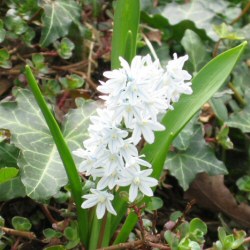
complementary bloom time with: Narcissus (early)
SCILLA
 Squill has bluebell-type flowers and performs best in well-drained soil. Colour, bloom time and preferred exposure will all depend on the species you choose. Most have grassy green foliage. Most should be planted 5 inches deep and 6 inches apart.
Scilla: unspecified types
Squill has bluebell-type flowers and performs best in well-drained soil. Colour, bloom time and preferred exposure will all depend on the species you choose. Most have grassy green foliage. Most should be planted 5 inches deep and 6 inches apart.
Scilla: unspecified types
with: Paeonia lactiflora
in shade with: Mertensia virginica, Pulmonaria
Scilla bifolia: the earliest-blooming squill
Scilla hispanica: Spanish Bluebell, Spanish Jacinth, Bell-Flowered Squill
 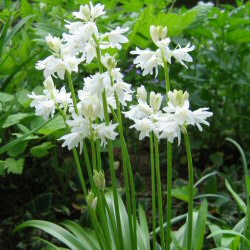
the purple form of this minor bulb is in the border around this page, left above and at the top of the page
synonym: Endymion hispanicus
synonym: Scilla campanulata
synonym: Hyacinthoides non-scripta
where: medium to heavy shade, under trees or shrubs, in woodland gardens
over: Hosta
under: Philadelphus or Kolkwitzia
combined with: Geranium (perennial forms) & ferns
Scilla hispanica 'Dainty Maid': lavender-pink Spanish Bluebells
Scilla non-scripta: English Bluebells
synonym: Endymion or Hyacinthoides
where: shade, in woodsy soil
under: Hosta
Scilla scilloides: small, palest pastel purple
echo under: Thymus serphyllum (of a similar soft colour)
Scilla sibirica: Siberian Squill
behind: Artemisia schmidtiana nana 'Silver Mound'
complementary bloom time with: Narcissus (daffodil and jonquil forms)
combined with: Eranthis hyemalis, Scilla tubergeniana, Chionodoxa de luciliae & Crocus
in shade with: Lamium maculatum 'White Nancy' (a clear white), Asarum canadense
around: Doronicum caucasicum
complementary bloom time with: Anemone blanda, Eranthis hyemalis, Galanthus nivalis
under: Tulipa (May-blooming) or late tall Tulipa of any colour
with: cream or yellow Intermediate Iris x germanica, Vinca minor, Stachys lanata
with: Tulipa 'Fringed Elegance' (yellow)
under shrubs: Philadelphus, Kolkwitzia
under: Hosta
Scilla sibirica 'Spring Beauty': blue Siberian Squill
where: rock gardens
under spring-flowering shrubs & trees: Forsythia, Daphne, Magnolia
Scilla tubergeniana: skim-milk white with blue striped petals
where: shrub borders, woodland settings
with: Iris reticulata
with: Galanthus nivalis, Eranthis hyemalis
FOR MORE BULBS & THEIR COMPANIONS, FOLLOW THE LINKS BELOW.
All of our own Gardens By The Bay pages can be accessed by clicking on the links below.
HOME
GARDEN POETRY |
GARDEN POETRY MUSE
GEORGIAN BAY VIEW
BOTANICAL LATIN - BASICS
COLOR THEORY
THE GARDENS
CORNER GARDEN CONSTRUCTION |
CORNER GARDEN PLANTING |
LONG GARDEN
EAST GARDEN |
HOSTA GARDEN |
NORTH GARDEN |
WINTER GARDENS
PLANT PARTNERSHIPS
BLUE PERENNIALS Aconitum -
Geranium |
Iris - Vinca
BULBS Allium - Hyacinthus |
Narcissus only |
Tulipa only |
Minor Bulbs
BUTTERFLY MAGNETS Anaphalis - Hemerocallis |
Liatris - Veronicastrum
 DAYLILIES Spider & Unusual Form DAYLILIES Spider & Unusual Form EDGERS Arabis - Iris |
Nepeta - Veronica
FOLIAGE PERENNIALS
Alchemilla - Tanacetum
HOSTA Hosta - all
HUMMINGBIRD-FRIENDLY PERENNIALS Alcea - Salvia
ORANGE PERENNIALS Achillea - Tulipa
ORNAMENTAL GRASSES Acorus - Imperata |
Miscanthus - Spodiopogon
PINK PERENNIALS Achillea - Lilium |
Lychnis - Veronica
PURPLE PERENNIALS Aconitum - Liatris |
Polemonium - Veronica
RED PERENNIALS Achillea - Veronica
SHADE PERENNIALS Aegopodium - Erythronium |
Ferns - Polemonium |
Polygonatum - Vinca
SILVER FOLIAGE PERENNIALS
Achillea - Cerastium
|
Cornus - Limonium
|
Lunaria - Veronica
SIMPLY SPECIAL PERENNIALS Acanthus - Saxifraga
WHITE PERENNIALS Achillea - Iris |
Kalimeris - Yucca
YELLOW PERENNIALS Achillea - Hypericum |
Inula - Verbascum
VARIEGATED-FOLIAGE PERENNIALS Acorus - Erythronium |
Hakonechloa - Lysimachia |
Miscanthus - Yucca
PLANT PROFILES
Dianthus 'Tiny Rubies' |
Geranium |
Geum coccineum |
Kerria japonica |
Knautia macedonica
Paeonia tenuifolia |
Papaver somniferum |
Rudbeckia |
Salvia 'East Friesland'
Trollius |
Veronica 'Sunny Border Blue'
PROPAGATION
DIVISION - SPRING ONLY |
DIVISION - FALL ONLY |
DIVISION - SPRING OR FALL |
DO NOT DIVIDE
FERTILIZATION
EDGERS Arabis - Iris |
Nepeta - Veronica
FOLIAGE PERENNIALS
Alchemilla - Tanacetum
HOSTA Hosta - all
HUMMINGBIRD-FRIENDLY PERENNIALS Alcea - Salvia
ORANGE PERENNIALS Achillea - Tulipa
ORNAMENTAL GRASSES Acorus - Imperata |
Miscanthus - Spodiopogon
PINK PERENNIALS Achillea - Lilium |
Lychnis - Veronica
PURPLE PERENNIALS Aconitum - Liatris |
Polemonium - Veronica
RED PERENNIALS Achillea - Veronica
SHADE PERENNIALS Aegopodium - Erythronium |
Ferns - Polemonium |
Polygonatum - Vinca
SILVER FOLIAGE PERENNIALS
Achillea - Cerastium
|
Cornus - Limonium
|
Lunaria - Veronica
SIMPLY SPECIAL PERENNIALS Acanthus - Saxifraga
WHITE PERENNIALS Achillea - Iris |
Kalimeris - Yucca
YELLOW PERENNIALS Achillea - Hypericum |
Inula - Verbascum
VARIEGATED-FOLIAGE PERENNIALS Acorus - Erythronium |
Hakonechloa - Lysimachia |
Miscanthus - Yucca
PLANT PROFILES
Dianthus 'Tiny Rubies' |
Geranium |
Geum coccineum |
Kerria japonica |
Knautia macedonica
Paeonia tenuifolia |
Papaver somniferum |
Rudbeckia |
Salvia 'East Friesland'
Trollius |
Veronica 'Sunny Border Blue'
PROPAGATION
DIVISION - SPRING ONLY |
DIVISION - FALL ONLY |
DIVISION - SPRING OR FALL |
DO NOT DIVIDE
FERTILIZATION
BULBS |
ORNAMENTAL GRASSES |
PERENNIALS |
SHRUBS |
VINES
LINKS
GARDENS |
LOCAL GARDENS |
BOTANICAL TERMINOLOGY
GARDENING BOOKS |
NON-GARDENING
HOME
|
|
|